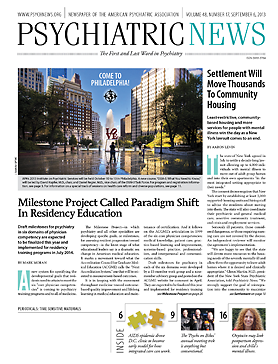With considerable media and political attention focused lately on the relationship between guns, violence, and mental illness, the APA Board of Trustees passed a position paper at its July meeting to try to illuminate from a psychiatric perspective issues that are often couched in hyperbole and misinformation.
The statement, which originated in the APA Assembly, emphasizes that while concerns about guns and mental illness are understandably much in the public eye following mass shootings, it is important to be aware that it is the daily use of guns in suicides and murders, and not the rare instances of mass killings, that account for the greatest proportion of gun-related deaths.
As for any link between violence and mental illness, the APA statement explains, “Although people with mental disorders, when treated, are not at increased risk of committing violence toward others, only a small minority of people with mental disorders, even without treatment, are violent.”
“Assembly members, and APA members at large, recognized the urgent need for an updated APA position statement that addressed the issues of guns, violence, and the mentally ill, issues arising in the wake of the tragedy occurring in Newtown last December,” explained Assembly Speaker Melinda Young, M.D. “Assembly members immediately recognized the wisdom and timeliness of such a position statement and voted to send it directly to the Board of Trustees for consideration at the July meeting, where it was passed with relatively minor clarifying changes.”
No Increase in APA Membership Dues
Board members also voted on several budget-related issues at the meeting, including agreeing to hold 2014 APA membership dues at the current level.
In addition, the Board agreed to increase registration fees for both the 2014 annual meeting and 2014 Institute on Psychiatric Services for nonmembers, but decided to maintain the current fee levels for APA members at both meetings.
Actions Taken on ECP-Related Issues
Several agenda items at the July meeting concerned ways in which the Association can increase its outreach to members-in-training (MITs) and early career psychiatrists (ECPs) and get them more involved in APA activities. Trustees voted, for example, to ask APA’s CEO/medical director to add a staff position whose purview will be to manage recruitment, retention, and marketing programs that focus on ECPs. They also approved funds for “pilot initiatives” to recruit more ECP APA members. To assess the success of new initiatives in the area of ECP recruitment and retention, the APA Membership Committee was tasked with designating outcome measures that will be used to evaluate the programs.
Also in line with a heightened focus on ECPs, the Board agreed to organize an ECP advisory panel that will report to the Board and the CEO/medical director. The panel’s membership will include representation from the Board, Assembly, and APA fellowship programs.
And since mentorship is valuable for career development of ECPs as well as MITs, the Board approved creation of the APA Mentors of the Year Award. The winners of the new award “will have a sustained career commitment to mentoring, a significant positive impact on their mentees’ careers, have fostered the careers of students and colleagues, and through their mentees have advanced research and patient care in the field of psychiatry.” One Mentor of the Year will be selected annually in each of three categories—academic educator, administration and leadership, and clinical practice. Winners will be invited to present a symposium at the APA annual meeting.
APA to Join HIT-Standards Organization
On another issue affecting the future of psychiatric practice, the Board voted to approve APA’s becoming a member of the organization Health Level 7 (HL7), which establishes health information technology (HIT) standards that govern how products such as electronic medical records communicate with each other. The proposal, which originated in the Assembly, noted that “while there are several HL7 work groups that develop standards that directly impact psychiatrists and patient care,” many of them with physician participants, “there is almost no one representing the needs of mental health groups, including psychiatry and APA.”
The Board action on joining HL7 calls for the appointment of at least three APA members to the organization “for the purpose of advancing the specialty’s interests in the development of health information technologies.” The appointees will report to APA’s Committee on Electronic Health Records. ■
